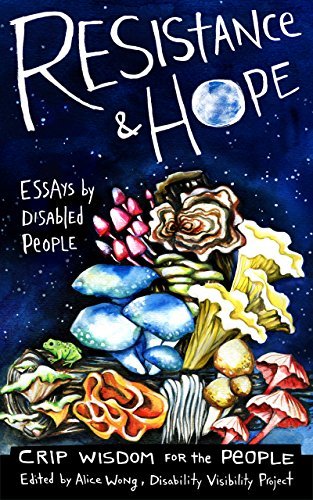Alice Wong: Moving Mountains in the 21st-Century
Alice Wong (b. 1974) is a phenomenal disability rights activist moving mountains within visual culture and sociopolitical culture. Utilizing both digital media and traditional writing techniques, Wong employs the art of writing to communicate the stories of people with disabilities and their unique lived experiences. As the founder of the Disability Visibility Project, she has created a wonderful platform for people within the community to share information, working toward the accurate representation of disability in arts and culture. This platform grew into a podcast, Disability Visibility, where important conversations pertaining to the cultural, political landscape are amplified in new media.
As of October 2023, Wong has published three books:
Disability Visibility: First-Person
Stories from the Twenty-First Century
The book, written in first person and edited by Wong, walks the reader through the personal stories of people with disabilities. The collection, at times, is gut-wrenching and unnerving, and at other times, eye-opening and powerful.
Resistance and Hope: Essays by Disabled People
In a comprehensive collection of 16 essays, the book discusses hope, disability rights, resistance, and the Trump political landscape. It is a must read for anyone interested in learning more.
Year of the Tiger —
An Activist’s Life
Through the use of multimedia, the memoir sheds light on Wong’s life navigating the world as an Asian American and person with disabilities.
Disability Intimacy: Essays on
Love, Care, and Desire
Expected release date: February 2024
In a February 2023 interview with NPR, Wong gives insight into her style of storytelling:
Wong’s writing style reminds me heavily of how Alex Soth, a documentary photographer, creates wonderful books in a way that provides “breadcrumbs” throughout each collection to excite the audience and create an engaging viewer experience.
An excerpt from the introduction in Disability Visibility reflects the importance of using art as a communicative vehicle to share new ways of thinking with the uninformed:
I will never forget the day a few years ago when my sister, who has been invested in the laws and social justice advocacy for disability rights, randomly handed me the book, Disability Visibility, to read. Knowing that the book shared a variety of short stories, I broke the rules of reading and turned to a random page. Somehow, the essay was everything I never knew that I needed to hear and everything that felt all too familiar.
As a child, I was often misunderstood as someone with an invisible disease and academically discriminated against in all subjects for struggling with reading. These experiences were an act of oppression and a place of trauma. Instead of keeping me in active learning environments to show my full potential with added assistance, administrators instead chose to segregate me, ignoring my equal right to a public, accessible education. My experience was indeed the “special” in “special education”, where classroom instruction was not designed according to each child’s individual needs, but rather grouped children that needed to be “fixed” as a whole.
For the first time, hearing a similar experience of segregation and oppression made me feel not so alone in a world where individuals with disabilities are often made to feel as second-class citizens. This gleaned knowledge continues to fuel my own personal and professional goals, as I look toward the future and educate others through my own craft and writing.
I encourage everyone to read Alice Wong’s books!




